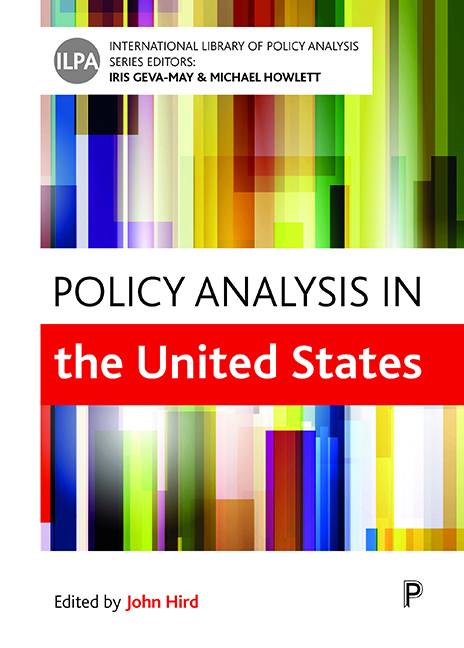Book contents
- Frontmatter
- Contents
- List of tables and figures
- Notes on contributors
- Editors’ introduction to the series
- Introduction
- Part One History, styles, and methods of policy analysis in the United States
- Part Two Policy analysis by governments
- Part Three Policy analysis outside of government
- Part Four Policy analysis education and impact internationally
- Index
Fifteen - Think tanks and policy analysis
Published online by Cambridge University Press: 12 April 2022
- Frontmatter
- Contents
- List of tables and figures
- Notes on contributors
- Editors’ introduction to the series
- Introduction
- Part One History, styles, and methods of policy analysis in the United States
- Part Two Policy analysis by governments
- Part Three Policy analysis outside of government
- Part Four Policy analysis education and impact internationally
- Index
Summary
At a moment when experts and analysts have become ubiquitous in American politics, their numbers have become diluted and distorted amid the ranks of think tanks. Both in Washington, DC and in state capitals, the number and variety of sources of analysis have exploded during the last half century. Many are housed in think tanks, public policy research organizations with origins that date back to the early 1900s. This chapter builds on my research over the past two decades, which examines the roles and impact of think tanks, and it identifies some of the opportunities and challenges for policy analysts within them. As the ranks of analysts have grown and the number of think tanks has proliferated, clarity around the purposes and influence of think tanks has diminished.
For much of the 20th century, policy experts were understood as neutral, credible, and above the rough and tumble of policy making. Progressive reformers early in the 20th century turned to the burgeoning social sciences for salvation. Reformers believed that the new ranks of policy experts trained in the new social science disciplines at universities would be capable of usurping patronage politics; experts would develop real solutions to the social and economic instabilities that stemmed from the Industrial Revolution. Many would be housed at newly formed think tanks, understood as independent, non-interest-based, nonprofit political organizations that produce and principally rely on research and expertise to obtain support and to influence the policy-making process (Rich 2004). American politics and society would be better informed and much improved as a result of think tank efforts.
During this period, the training of new policy experts became a central focus of reformers, with the creation of schools for policy analysts at leading universities and of agencies within government departments that produced research and evaluation studies for decision makers. Twentieth-century scholars observed these developments, and they contributed to the prevailing understanding of experts in American policy making: as important background voices that bring rational, reasoned analysis to long-term policy discourse based on the best evidence available.
For much of the last century, this assessment was basically accurate; experts and analysts fulfilled these mandates. By the beginning of the 21st century, however, the ranks of real-life policy experts scarcely conformed to the promise of making policy choices clearer and more rigorous and decisions necessarily more rational.
- Type
- Chapter
- Information
- Policy Analysis in the United States , pp. 281 - 294Publisher: Bristol University PressPrint publication year: 2018



